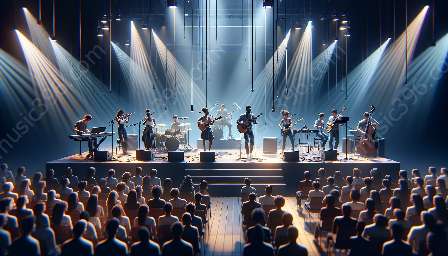Music performance has a profound psychological impact on audiences, shaping their emotions, thoughts, and behaviors. This article will explore the distinct effects of both contemporary and traditional music performances on the audience, delving into the ways in which music influences the emotional and cognitive responses of the listeners.
Impact of Contemporary Music Performance
Contemporary music performances, characterized by dynamic, cutting-edge compositions, and innovative stage presentations, have a unique influence on audience psychology. The fusion of electronic sounds, visual effects, and unconventional arrangements creates an immersive experience, triggering a range of emotional responses.
Emotional Engagement
Contemporary music performances often evoke intense emotional engagement from the audience. The use of modern technology and multimedia elements enhances the sensory experience, captivating the audience and eliciting powerful emotional reactions. The combination of pulsating rhythms, intricate harmonies, and visually stimulating effects can lead to feelings of euphoria, excitement, or even introspection.
Cognitive Stimulation
Beyond emotional impact, contemporary music performances also stimulate cognitive processes in the audience. The complexity and experimental nature of modern compositions can challenge the listener's cognitive abilities, prompting heightened focus and attention. The fusion of diverse musical genres and avant-garde techniques may spark intellectual curiosity and creative thinking among the audience members.
Social Connection
Moreover, contemporary music performances often serve as a means of social connection and collective experience. The shared appreciation of innovative sounds and avant-garde performance art fosters a sense of community among the audience, promoting social bonding and a shared identity based on musical preferences.
Effect of Traditional Music Performances
Conversely, traditional music performances, rooted in cultural heritage and historical significance, exert a distinct psychological impact on the audience. The preservation of musical traditions and the authentic rendition of historical compositions evoke a sense of nostalgia and cultural connection among the listeners.
Nostalgic Reverie
Traditional music performances often transport the audience to bygone eras, triggering feelings of nostalgia and sentimental reminiscence. The timeless melodies and timeless rhythms serve as a bridge to the past, evoking a deep sense of connection to cultural roots and heritage.
Cultural Identity
Traditional music performances play a pivotal role in shaping the cultural identity of the audience. The celebration of indigenous music and traditional customs fosters a strong sense of cultural belonging, instilling pride and passion for the heritage. Audience members often exhibit heightened cultural sensitivity and empathy towards diverse musical traditions.
Therapeutic Benefits
Besides the emotional and cultural impact, traditional music performances offer therapeutic benefits to the audience. The soothing, rhythmic patterns and familiar melodies can induce relaxation and alleviate stress, creating a calming and meditative ambiance. Such performances serve as a form of musical therapy, promoting emotional well-being and mental tranquility among the listeners.
Conclusion
In conclusion, music performance, whether contemporary or traditional, exerts a profound psychological influence on the audience. Contemporary performances engage the audience through innovative sensory experiences, cognitive challenges, and social connectivity, while traditional performances evoke nostalgia, cultural identity, and therapeutic effects. By understanding the psychological effects of music performance, artists and scholars can further enhance the audience's musical experience, creating meaningful and transformative encounters that resonate deeply with the listeners' emotions and cognition.















































